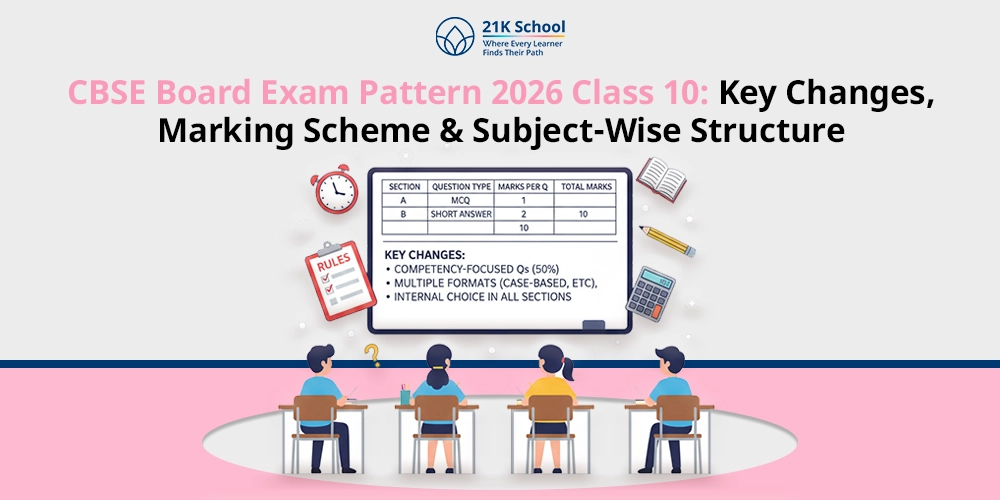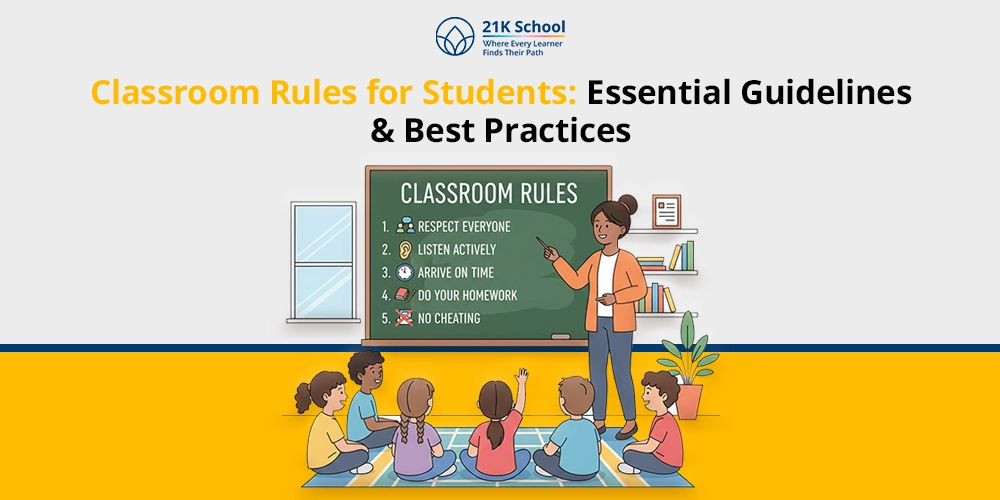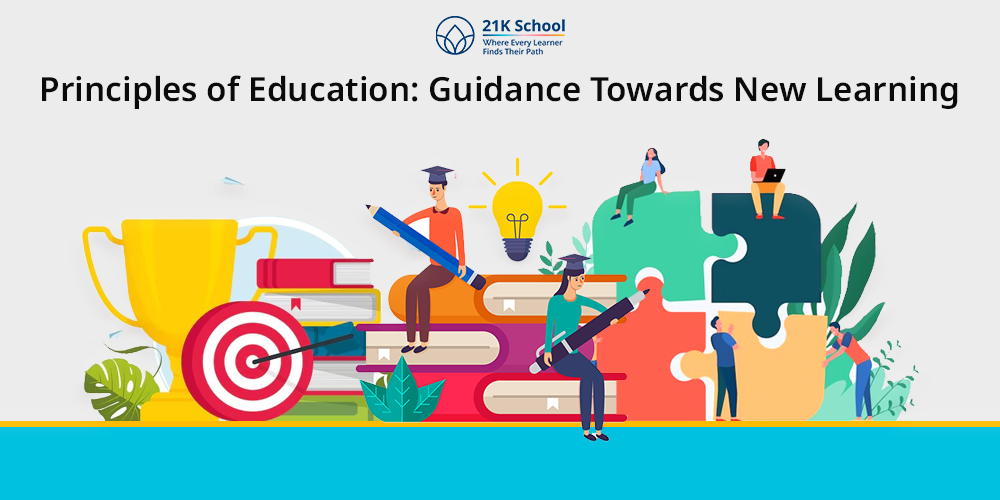
Principles of learning are the field of learning psychology which is also known as the law of learning, which helps in building an effective teaching and learning process.
Various researchers in the field of educational psychology have created principles of learning which allow students to learn in an easy and enjoyable way.
The principles of learning make sure that both the teacher and the student receive an equal learning experience.
These principles help in the cognitive development of children and enhance their social-emotional learning. Principles of learning function as significant guidelines that affect training and education.
They also help to emphasise professional growth in both students and educators. This also helps in promoting inclusive learning and enhances learning outcomes as compared to traditional passive learning.
These principles allow students to discover and enhance problem-solving skills through self-directed learning as well as engaging in a variety of learning.
Contents
Meaning of Principles of Learning
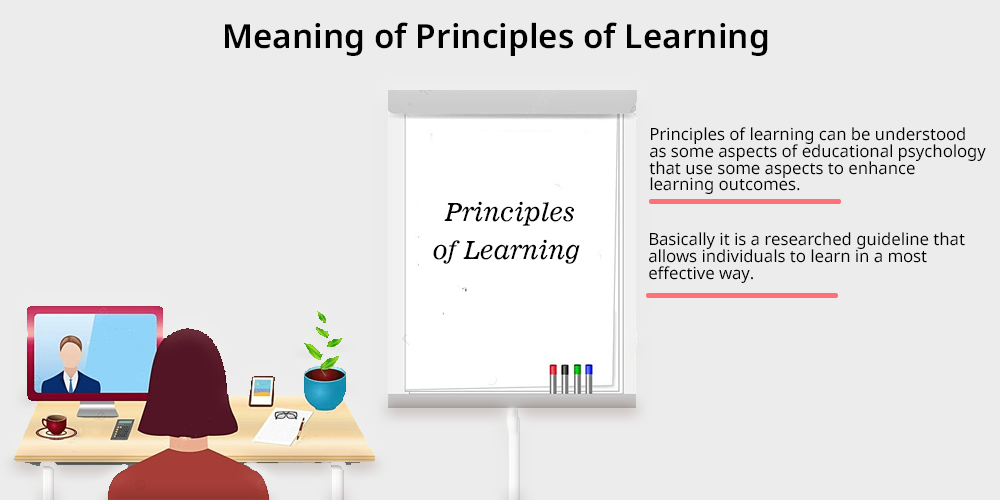
Principles of learning can be understood as some aspects of educational psychology that use some aspects to enhance learning outcomes. Basically it is a researched guideline that allows individuals to learn in a most effective way.
Basically the principles of learning are theory and research based which enables teachers to enhance the teaching and learning process. This principle promotes holistic education and allows students to understand the psychology behind the learning process.
This helps in analysing the similarities and differences of context and identifying the factors that influence the learning process.
The principle of learning is different from the principle of teaching, but both are used to enhance the teaching and learning process.
There are mostly 8 important principles of learning, out of which 3 laws are developed by Edward Thorndike, known as readiness, exercise and effect. This offers more information about what motivates people to learn.
Top 8 Principles of Learning
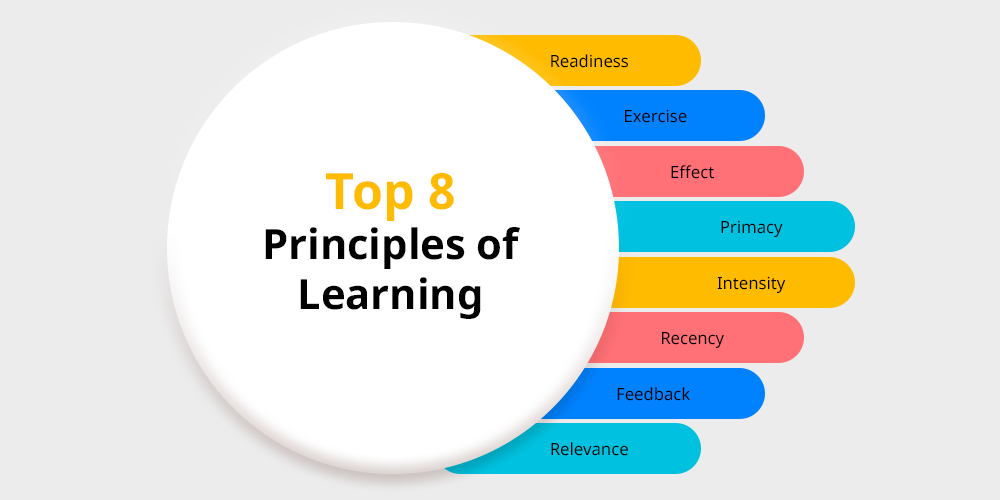
The principles of learning are some learning practices that allow individuals to effectively understand the learning process.
The principles are developed by various researchers and are applied to real world situations. Here you can check the principles of learning mentioned below.
1. Readiness
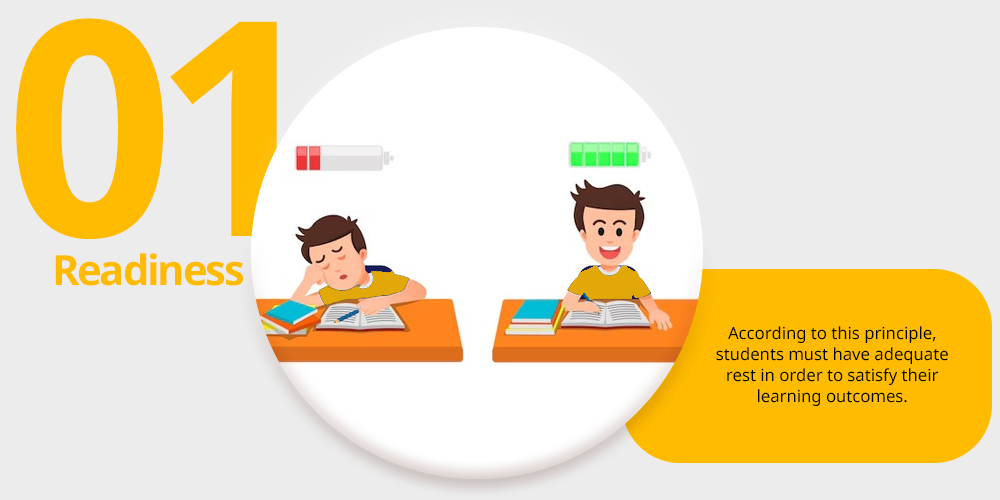
According to this principle, students must have adequate rest in order to satisfy their learning outcomes. As learning methods are an active process, and an active health and mind are required to indulge in the learning process.
Students with exhaustion, fatigue, stress and illness cause them to learn poorly. Even distraction, lack of interest, improper time management skills and lack of study routine also cause students to hamper their learning process.
In order to secure good marks, students go through emotional readiness in order to acquire the expected results.
2. Exercise

As per these principles of learning, practice occurs when learning continues. This principle allows students to recall, review and summarise their learning and physical applications.
Through exercise, students develop habits of mind in order to create learning experiences. Through this principle, educators can create equal learning opportunities for students through which they can achieve goal-oriented learning practices.
In this method, once the learning goal is achieved, then there is no need to achieve the same goal twice, which helps in exercising it for a longer period of time.
3. Effect
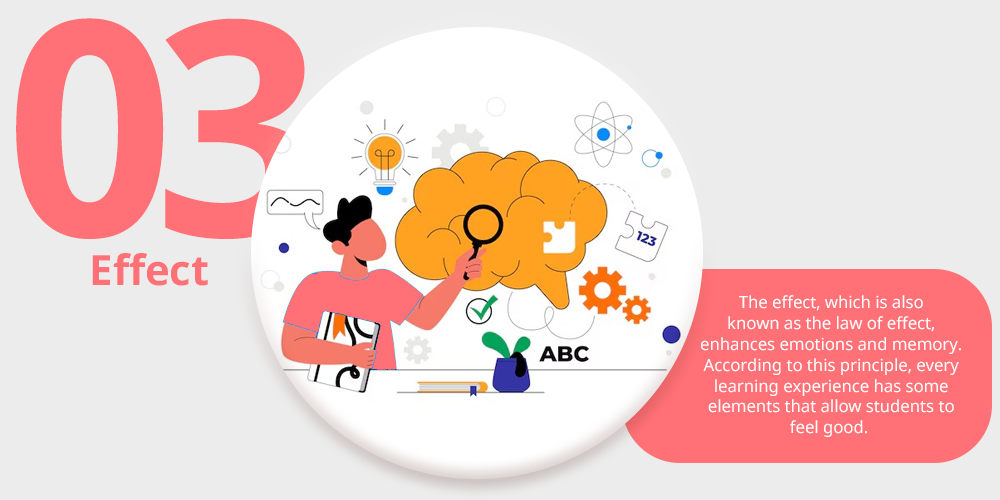
The effect, which is also known as the law of effect, enhances emotions and memory. According to this principle, every learning experience has some elements that allow students to feel good.
The feeling of self-pleasure enhances the learning experiences of students and allows them to understand the concepts more easily. Through this, students gain valuable knowledge, and educators can help their students to intensify their learning experience through problem-solving.
4. Primacy
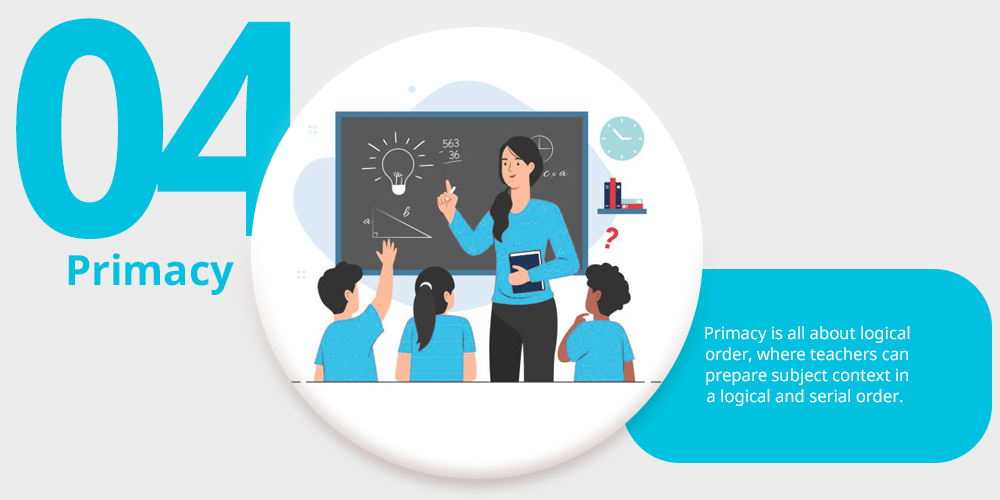
Primacy is all about logical order, where teachers can prepare subject context in a logical and serial order. This allows students to learn in a preceding step, which facilitates the subject matter for students.
Isolation in learning causes students to perform poorly in the learning process, which hampers their overall performance due to confusion and time consumption. Teachers can prepare an effective lesson plan in order to facilitate the smooth delivery of subjects accurately.
5. Intensity
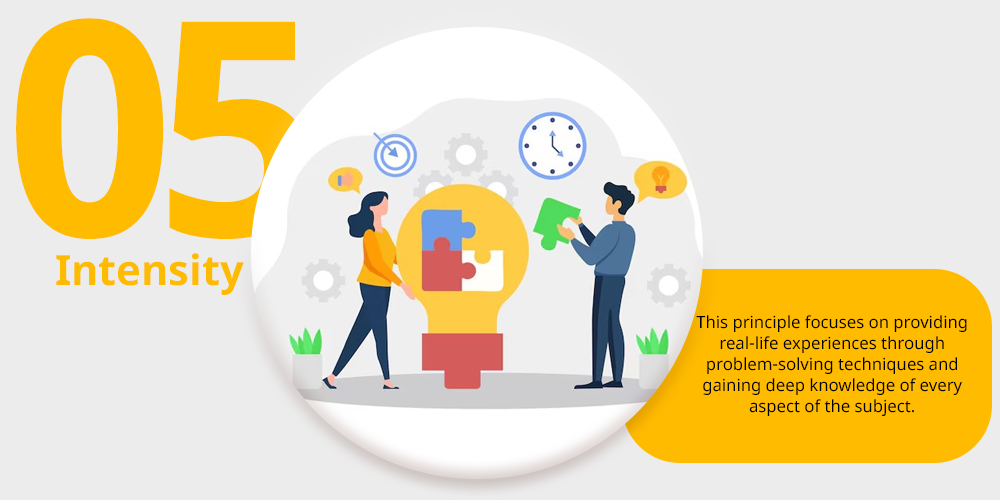
According to this principle, intense material is more retained, which helps in enhancing the teaching and learning process through interactive studies.
A sharp, exciting learning experience allows students to get rid of boring study routines and enhances personal experiences. This principle focuses on providing real-life experiences through problem-solving techniques and gaining deep knowledge of every aspect of the subject.
6. Recency
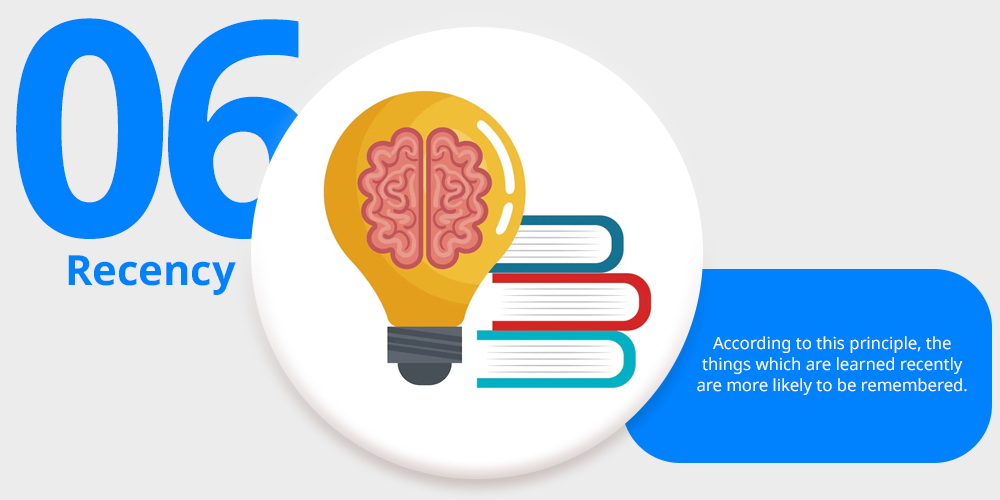
According to this principle, the things which are learned recently are more likely to be remembered. This enhances knowledge retention among students and allows them to remember things for a longer period of time.
Recency allows students to understand complex problems more effectively and reduces their time of learning. In recent years, individuals can understand complex problems in a simpler and effective way as compared to traditional schooling methods.
7. Feedback

Feedback is another learning principle that allows teachers to understand the progress of students. These learning principles allow us to get clear, understandable and informative information about the learning skills.
This helps in bridging the gap between the learning process and students’ performance, which enables both teachers and students to give and receive quick feedback.
8. Relevance
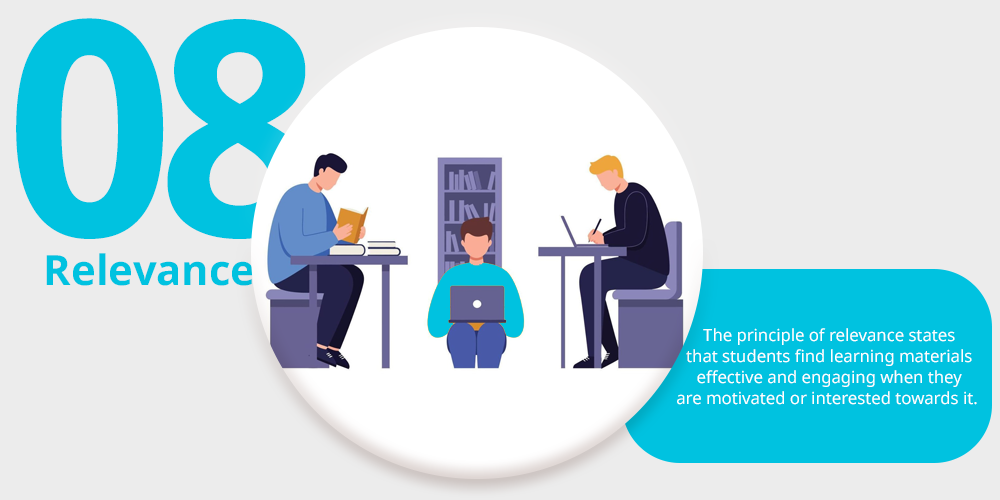
The principle of relevance states that students find learning materials effective and engaging when they are motivated or interested towards it. According to this principle, it is essential to make learning relevant to students’ interests in order to enhance their participation and attention.
Through proper relevance, students can actively engage in the learning process without any conflict and understand concepts in a better way.
Conclusion
The learning principles are fundamental rules that improve the educational process for teachers and students alike. Teachers can establish a positive learning environment that is more productive and captivating by comprehending and putting these principles into practice.
These principles include readiness, exercise, effect, primacy, intensity, recency, feedback, and relevance. These ideas support inclusive learning, enhance overall learning outcomes and advance cognitive and emotional development.
Ultimately, teachers can enable students to become self-directed learners with the abilities needed for problem-solving and critical thinking in practical settings by adopting these research-based teaching methods.

